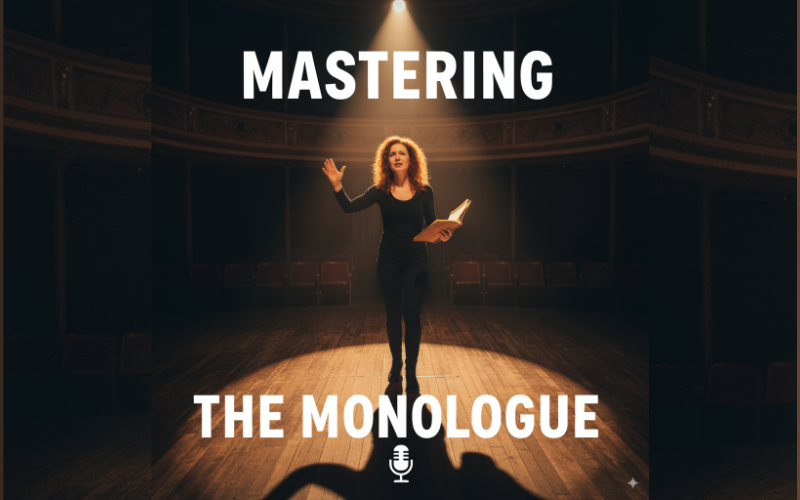Mastering the Monologue.

This post guides actors: select compelling material, reveal authentic self via deep preparation, and deliver with confidence for impactful auditions.
The Core Philosophy: Beyond "Character" to "Self"
One of the most profound shifts in approaching monologues is understanding that it's less about "playing a character" and more about revealing your authentic self within the circumstances of the play. Michael Shurtleff emphasizes that auditors are interested in the real you reacting to a remarkable situation in a remarkable and unique way, rather than a fully molded "character" developed over weeks of rehearsal. Constantin Stanislavski, too, suggests that when a real artist delivers a soliloquy, they infuse it with their own conception of life, speaking in their own right within the play's context.
Similarly, Uta Hagen stresses the necessity of knowing who you are and using that knowledge in the characters you portray. Bryan Cranston, in his philosophy for choosing projects, always seeks out the "well-written word," which he believes will not fail an actor, emphasizing that good writing is everything. It’s about letting the playwright's ideas become yours, sensing the power and quality of thinking in the text.
Choosing Your Material Wisely
The selection of your monologue is paramount, and several experts offer key advice:
• Prioritize Well-Written Stories: Cranston Bryan prioritizes the story, noting that good storytelling is timeless and the essential human art form. If the story isn't compelling and the writing isn't well-constructed, even a great character or director won't save it. Michael Chekhov advises that the actor's task is to "unseal" the playwright's hidden treasures beyond a dry intellectual understanding.
• Pick Material You Like and Do Well: Don't choose material you hate just because you think it's "appropriate" or "impressive". Select something you enjoy, are comfortable with, and that truly compels you, appealing to your sense of play. The material should show you off to your best advantage and allow the casting director to get to know who you are.
• Relevance and Typecasting: For agent auditions, choose material that suits the agent's needs (contemporary for film/TV, though classical is still important for theatre) and comes from a role in which you would likely be cast. This demonstrates that you understand how you will be marketed. Jenna Fischer recounts using a simple, funny, charming, and suspenseful comedic monologue that "killed" in agent auditions.
• Seek Active, Fresh Material: Avoid "story pieces" where a character tells about something that already happened, as the underlying "reason" or "need" often gets lost out of context. Instead, look for "active" material that is "more in the moment" and "more involved with the other character or characters". Casting directors often want to be "surprised," so actively search for new and fresh material that they haven't seen "eight hundred times". You can find inspiration by researching the work of "prototype" actors you admire.
• Brevity and Focus: Monologues are often perceived as "too long and too slow," so aim for fast, short ones that emphasize quality over quantity. If dealing with a long speech, Shurtleff suggests pretending it's several short speeches, seeking a response from your imaginary partner to create "rest points".
• Monologue vs. Soliloquy: Uta Hagen clarifies that a monologue is a character talking aloud when alone, or to absent characters or objects, at a moment of crisis. A soliloquy is similar, specifically talking to oneself, revealing thoughts and feelings to the audience. If a character talks to the audience, Hagen considers it a "duologue," with the audience as a partner.
• Avoid Sensitive Topics in Office Settings: For agent office auditions, it's wise to avoid explosive, highly charged emotional material, or topics like guns, violence, smoking, nudity, or graphic rape, as there may be other personnel present who could be made uncomfortable.
Preparing for Impact
Once you've selected your material, diligent and insightful preparation is key:
• Emotional Aliveness and Self-Stimulation: Sanford Meisner defines preparation as a device that allows you to start a scene or play in a condition of emotional aliveness. It's about self-stimulation of emotion, a deeply personal and often secret process. The source of this inner life doesn't always have to be directly related to the scene's needs, as illustrated by an actor who would shake a ladder backstage to induce fury before a scene.
• The "Magic If" or Particularization: Meisner's "Magic If" or particularization involves describing a personal situation that brings you to the emotional place needed for the scene, regardless of how alien the script's circumstances might be. This "as-if" creates a tangible, personal stake in the action. Chubbuck also uses substitution, endowing the other actor with a real-life person who triggers appropriate emotional and physical reactions for history, urgency, and desperation.
• Learn Lines by Rote, Not with Inflection: Meisner instructs actors to learn lines mechanically, without meaning, readings, or interpretation. This "cold" approach helps eliminate ingrained habits of "line readings" and allows the emotional truth to emerge organically later.
• Focus on the "Moment Before": Every scene begins in the middle, and it's your job to provide what comes before it. Shurtleff calls this the "moment before," which needs to be fully developed to ensure you're warmed up and present from the very beginning of your reading. Chubbuck states that the right "Moment Before" will drive your scene objective, inspiring great need and urgency.
• Find Your "Fighting For" (Conflict): Instead of vague "goals" or "motivations," Shurtleff urges actors to identify "what you are fighting for" in a scene. This positive motivation creates maximum conflict, which is the essence of drama and makes a performance interesting.
• Utilize Inner Monologue: Ivana Chubbuck highlights the inner monologue as the unspoken dialogue in your head, filled with details and full sentences. It should be directed at the other person using "you," not "he" or "she," to create interactive behavior and keep listening active, even when you're not speaking. This inner conversation helps to foreshadow future events and provides human reality to any story, even fantastical ones.
• Psychological Gesture: Michael Chekhov's Psychological Gesture involves finding a simple physical gesture that encapsulates the character's main dynamic and quality. Practicing this gesture, first without words, then with words, and finally with words alone, imbues the dialogue with power, expressiveness, and individual nuances.
Technical & Practical Considerations
• Be Seen and Heard: These are fundamental aspects of any reading. Always ask if you are in the light, as overhead lighting can easily obscure your face. Ensure you can be heard comfortably, as many actors tend to be too soft.
• Staging Your Monologue: When alone on stage, Shurtleff suggests positioning your imaginary partner downstage of you, facing you, allowing you to use the entire upstage area for movement. Movement can be valuable, so don't stand rooted to one spot.
• Accents and Physicalities: Only use an accent if specifically required, and ensure it doesn't overshadow your emotional objectives. Hagen suggests that if you're playing a physical characteristic (like a limp), you can make it secondary to what you are fighting for, rather than letting it define the performance.
• Dress Appropriately: Your attire should make sense for the role, not be a costume. As Brian O'Neil points out, you wouldn't wear a mini-dress for Blanche in A Streetcar Named Desire.
The Audition Mindset
• Confidence and Goodwill: Your demeanor before and after the reading conveys what kind of person you are to work with. Projecting an easy, affable, cooperative attitude is crucial. Brian O'Neil stresses being "businesslike while giving the appearance of being casual and relaxed".
• Don't "Paper-Please": Ivana Chubbuck warns against "paper-pleasing," which is mindlessly following script instructions or guessing what the casting director wants. Instead, make bold choices, take risks, and be visually expressive.
• Practice and Persistence: Nothing prepares you for the endless process of auditioning quite like practicing auditioning itself. Jenna Fischer advises viewing each audition as an opportunity to practice and grow, focusing on creating a consistent body of quality acting rather than solely on booking the job. Have "thirty things ready" to present at any moment, as actors often lose opportunities by having "nothing else" to show.
• Embrace the Journey: The actor's life is unpredictable, filled with ups and downs. Maintain your artistic resolve, learn from every experience, and remember that the world needs artists and stories.
By internalizing these principles – focusing on personal truth, making informed material choices, preparing with depth, and approaching the audition with confidence and an active mindset – you can transform the daunting task of monologue selection into an empowering opportunity to showcase your unique talent.



Write A Comment
No Comments